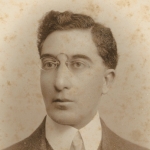There, in that lost
corner of the ordnance survey.
Drive through the vanity —
two pubs and a garage — of Satley,
then right, cross the A68
past down-at-heel farms and a quarry,
you can't miss it, a 'T' instead of a 'plus'
where the road meets a wall.
If it's a usual day
there'll be freezing wind, and you'll
stumble climbing the stile
(a ladder, really) as you pull
your hat down and zip up your jacket.
Out on the moor,
thin air may be strong enough to
knock you over,
but if you head into it
downhill, you can shelter
in the wide, cindery trench of an old
leadmine-to-Consett railway.
You may have to share it
with a crowd of dirty
supercilious-looking ewes, who will baaa
and cut jerkily away
after posting you blank stares
from their foreign eyes.
One winter we came across five
steaming, icicle-hung cows.
But in summer, when the heather's full of nests,
you'll hear curlews
following you, raking your memory, maybe,
with their cries;
or, right under you nose,
a grouse will whirr up surprised,
like a poet startled by a line
when it comes to her sideways.
No protection is offered by trees —
Hawthorn the english call May,
a few struggling birches.
But of wagtails and yellowhammers, plenty,
and peewits who never say peewit,
more a minor, go'way, go'way.
Who was he, Salter? Why was this his gate?
A pedlars' way, they carried
salt to meat. The place gives tang to
survival, its unstoppable view,
a reservoir, ruins of the lead mines, new
forestry pushing from the right, the curlew.


















Comment form: